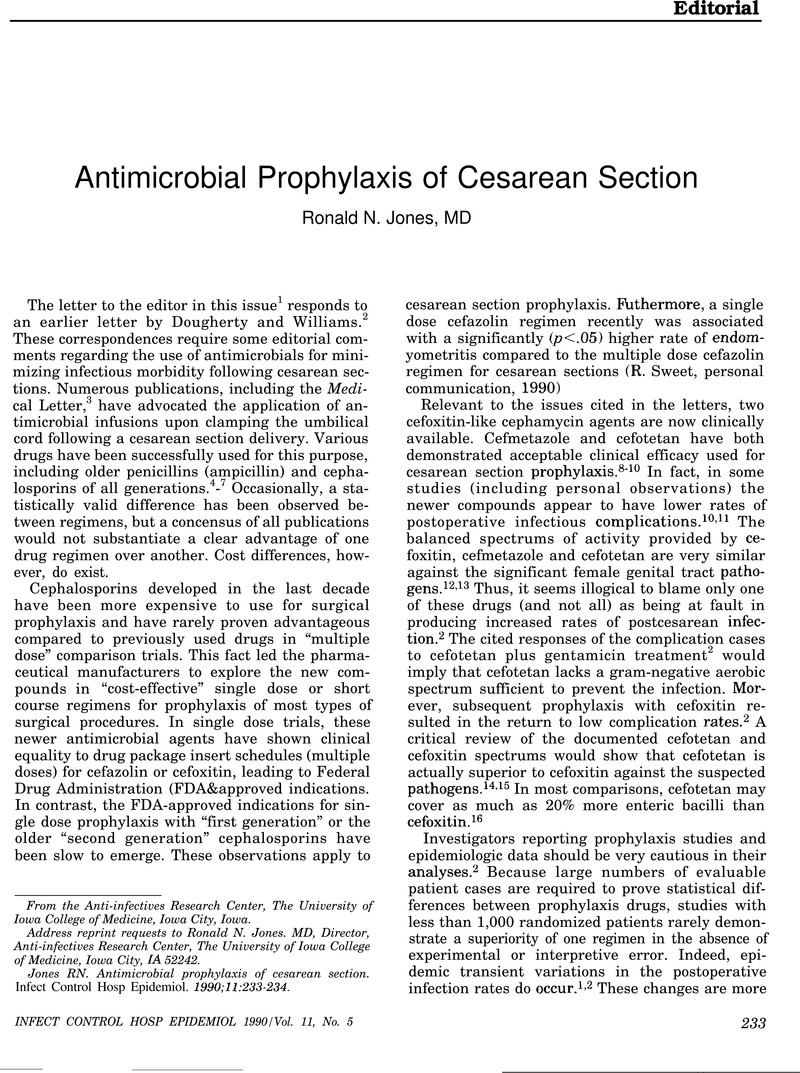No CrossRef data available.
Article contents
Antimicrobial Prophylaxis of Cesarean Section
Published online by Cambridge University Press: 21 June 2016
Abstract
An abstract is not available for this content so a preview has been provided. As you have access to this content, a full PDF is available via the ‘Save PDF’ action button.

- Type
- Editorial
- Information
- Copyright
- Copyright © The Society for Healthcare Epidemiology of America
References
1.
Frank, E. Prophylaxis of cesarean sections. Infect Control Hosp Epidemiol
1990;11:228.10.2307/30147033Google Scholar
2.
Dougherty, SH, Williams, VS. Prophylaxis for cesarean section: where to turn?
Infect Control Hosp Epidemiol. 1990;11:9.10.2307/30144248CrossRefGoogle ScholarPubMed
4.
Moro, M, Andrews, M. Prophylactic antibiotics in cesarean section. Obstet Gynecol.
1974;44:668–692.Google Scholar
5.
Gall, SA. The efficacy of prophylactic antibiotics in cesarean section. Am J Obstet Gynecol.
1979;134:506–511.10.1016/0002-9378(79)90830-5CrossRefGoogle ScholarPubMed
6.
Silver, HG, Forward, KR, Livingstone, RA. Multicenter comparison of cefoxitin versus cefazolin for prevention of infectious morbidity after nonelective cesarean section. Am J Obstet Gynecol.
1983;145:158–163.Google Scholar
7.
Gonik, B. Single- versus three-dose cefotaxime prophylaxis for cesarean section. Obstet Gynecol. 1985;65:189–193.Google Scholar
8.
McGregor, JA, French, JL, Makowski, E. Single-dose cefotetan versus multi-dose cefoxitin for prophylaxis in cesarean section in high-risk patients. Am J Obstet Gynecol. 1986;154-955–960.10.1016/0002-9378(86)90497-7Google Scholar
9.
Galask, RP, Weiner, C, Petzold, CR. Comparison of single-dose cefmet-azole and cefotetan prophylaxis in women undergoing primary cesarean section. J Antimicrob Chemother. 1989;23(suppl D):105–108.10.1093/jac/23.suppl_D.105Google Scholar
10.
Griffith, DL, Novak, E, Greenwald, CE, Metzler, CM, Paxton, LM. Clinical experience with cefmetazole sodium in the United States: an overview. J Antimicrob Chemother. 1989;23(suppl D):21–33.10.1093/jac/23.suppl_D.21Google Scholar
11.
Jones, RN, Slepack, JM, Wojeski, WV
Cefotaxime single-dose surgical prophylaxis in a prepaid group practice: comparisons with other cephalosporins and ticarcillin/clavulanic acid. Drugs. 1988;35(suppl 2):116–123.10.2165/00003495-198800352-00025Google Scholar
12.
Jones, RN. Review of the in-vitro spectrum and characteristics of cefmetazole (CS-1170), a cephamycin antimicrobial agent. J Antimicrob Chemother. 1989;23(suppl D):1–12.10.1093/jac/23.suppl_D.1Google Scholar
13.
Ohm-Smith, MF, Sweet, RL. In vitro activity of cefmetazole, cefotetan, amoxacillin-clavulanic acid, and other antimicrobial agents against anaerobic bacteria from endometrial cultures of women with pelvic infections. Antimicrob Agents Chemother. 1989;31:1434–1437.10.1128/AAC.31.9.1434CrossRefGoogle Scholar
14.
Jones, RN. Cefotetan: a review of the microbiologic properties and antimicrobial spectrum. Am J Surg. 1988a;155:16–23.10.1016/S0002-9610(88)80207-1CrossRefGoogle ScholarPubMed
15.
Jones, RN. Cefmetazole(CS-1170), a “new” cephamycin with a decade of clinical experience. Diagn Microbiol Infect Dis. 1989;12:367–379.10.1016/0732-8893(89)90106-5Google Scholar
16.
Barry, AL, Jones, RN. Cross-susceptibility between cefotetan and cefoxitin: absence ofcross-resistance. J Clin Microbiol.
1987;25:1570–1571.10.1128/jcm.25.8.1570-1571.1987Google Scholar
17.
Jones, RN, Thornsberry, C. Cefotaxime (HR756): a review of the in vitro antimicrobial properities and spectrum of activity. Rev Infect Dis. 1982;4(suppl):S300–S315.10.1093/clinids/4.Supplement_2.S300Google Scholar
18.
Jones, RN, Barry, AL. Optimal dilution susceptibility testing conditions, recommendations for MIC interpretation and orality control guidelines for the ampicillin/sulbactam combination. J Clin Microbiol. 1987:25:1920–1925.10.1128/jcm.25.10.1920-1925.1987Google Scholar




